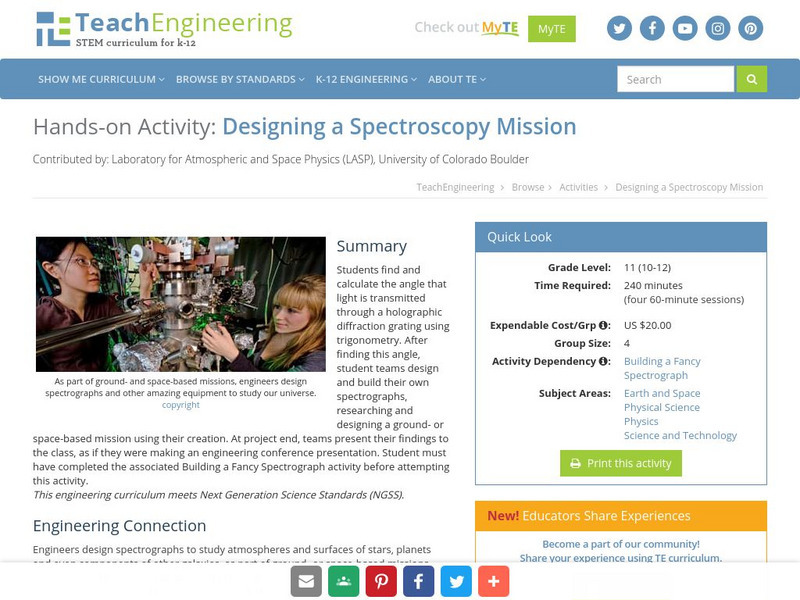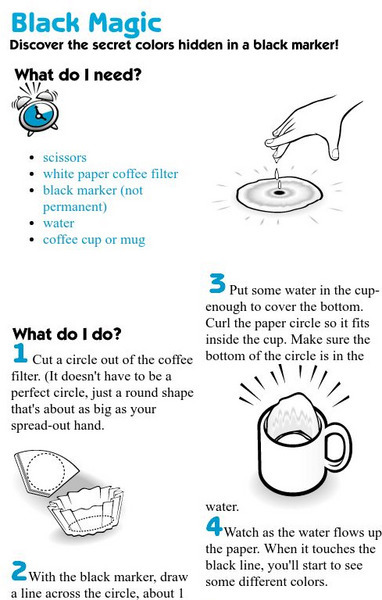Hi, what do you want to do?
NumberNut
Number Nut: Basic Topics: Shapes, Symbols, and Colors: Colors
A short explanation of how we see color and what each of the primary and secondary colors symbolize.
TeachEngineering
Teach Engineering: Waves Go Public!
Students apply everything they have learned over the course of the associated lessons about waves, light properties, the electromagnetic spectrum, and the structure of the eye, by designing devices that can aid color blind people in...
CK-12 Foundation
Ck 12: Chemistry Simulation: Neon Lights
[Free Registration/Login Required] Neon lights are a type of discharge tube. Observe how electrons create colored light in a hydrogen gas discharge tube. Can you figure out why hydrogen's emission spectrum contains more than one color of...
Physics Central
Physics Central: Physics in the Snow: Snowy Colors
A simple experiment through which students observe the connection between color and heat and prove that dark-colored objects and light-colored objects heat at different rates, even when exposed to the same heat or light source.
Exploratorium
Exploratorium: How to Build a Spectroscope
Instructions for how to construct a spectroscope from basic materials, which can be used to study colors produced by light from different sources. Adult supervision may be required for the use of the utility knife. Includes an...
Utah Education Network
Uen: Enlightening Explorations, Part Iii
This lesson contains the following labs: Rainbows, Refraction with Prisms, and What Color Is It? Students will study light by reading various nonfiction texts and viewing a video lesson. Then students will engage in the following labs:...
Science Struck
Science Struck: Wavelength of Visible Light Spectrum
Explains where visible light fits into the electromagnetic spectrum and the wavelengths for the different colors we see.
Center of Science and Industry
Cosi Columbus: Coffee Filter Rainbows
Science experiment that demonstrates chromotography. Includes full list of materials, procedures, and scientific explanation of what happens with different colors when they are soaked with water.
TeachEngineering
Teach Engineering: Designing a Spectroscopy Mission
Students find and calculate the angle that light is transmitted through a holographic diffraction grating using trigonometry. After finding this angle, student teams design and build their own spectrographs, researching and designing a...
Optical Society
Optical Society of America: Optics for Kids: What Causes Rainbows?
An experiment to demonstrate how to make a rainbow and why they form.
Exploratorium
Exploratorium: Black Magic
A great and easy-to-do activity where students separate the colors in a black marker and develop an understanding that black is a composite of other colors.
Science Education Resource Center at Carleton College
Serc: Mn Step: Why Is the Sky Blue?
Young scholars will learn about refraction and the scattering of sunlight as it enters the atmosphere, which causes the colors in light to separate, giving us blue skies and colorful sunrises and sunsets.
University of Colorado
University of Colorado: Physics 2000: Spectral Lines
Several pages from an excellent site which describe the science of spectroscopy. The unique atomic emission (and absorption) line spectrum of elements are illustrated and explained. Includes a Java applet depicting the quantum energy...
Khan Academy
Khan Academy: Understanding Spectra
This is an 8-problem quiz/practice to increase students' understanding of spectra. Color is a property of light. Test your understanding of this concept and how light can be represented in with a spectral power distribution.
Optical Society
Optical Society of America: Optics for Kids: Release the Rainbow
A simple activity to demonstrate how light separates into colors when it passes through water acting as a prism.
Frostburg State University
General Chemistry Online: Ten Signs of Chemical Change
Resource provides the ten signs that tell when a chemical change has occured. Each sign has a detailed explanation.















